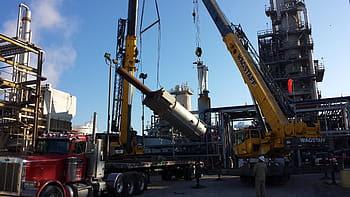Oil Prices Drop After Iran's Attack on Israel
16 April 2024 By Johnber

NewsTogether

Over the weekend, there was a conflict between Iran and Israel, and this has led to a decrease in the price of oil. Why does this matter? Well, oil is a very important resource because it's used to make things like gasoline for cars and diesel for trucks. So, when the price of oil changes, it can affect how much we pay for these things and many other items in our daily lives.
Before the attack happened, many people were already expecting something to happen between Iran and Israel. Because of this, the price of oil had gone up last week and was almost at its highest point in six months! But now, after the attack, the price has dropped a bit, although it's still quite high compared to what it was before.
Let's take a look back at 2022. Do you remember when Russia invaded Ukraine? Well, when that happened, the price of oil went up a lot because people were worried that there wouldn't be enough oil for everyone. This made everything more expensive, like the gas you put in your car and other things you buy.
Now, experts are keeping a close eye on what happens next between Israel and Iran. If Israel responds strongly to the attack, the price of oil could go up again. But for now, it looks like things might stay the same.
Another important thing to know is that Iran is one of the world's biggest producers of oil. So, what happens there can affect the rest of the world too. There's a place called the Strait of Hormuz, which is like a big highway for ships carrying oil. About 20% of all the oil in the world passes through there! Recently, Iran stopped a ship that was going through the strait, which has made some people worried about whether oil shipments will be affected.
So, while the situation is tense right now, we'll have to wait and see what happens next. The price of oil can change a lot depending on what's going on in the world, so it's something that's important to keep an eye on.
Connecting School
Inflation(인플레이션)
Inflation is the rate of increase in prices over a given period of time. Inflation is typically a broad measure, such as the overall increase in prices or the increase in the cost of living in a country. But it can also be more narrowly calculated—for certain goods, such as food, or for services, such as a haircut, for example. Whatever the context, inflation represents how much more expensive the relevant set of goods and/or services has become over a certain period, most commonly a year.
Keywords
- Conflict: A serious disagreement or argument, typically a protracted one. Example: The conflict between Iran and Israel escalated over the weekend.
- Benchmark: A standard or point of reference against which things may be compared or assessed. Example: Brent crude is a key benchmark for oil prices internationally.
- Reprisal: An act of retaliation or revenge for a previous attack. Example: Iran's attack on Israel was seen as a reprisal for previous actions.
- Sanctions: Measures taken by countries to restrict trade or impose penalties on another country. Example: Western nations imposed sanctions on Russia after its invasion of Ukraine.
- Surge: A sudden and significant increase. Example: Oil prices surged to $120 a barrel after the conflict escalated.
- Geopolitical: Relating to politics, especially international relations, as influenced by geographical factors. Example: The geopolitical tension in the Middle East affects global markets.
- Inflation: A general increase in prices and fall in the purchasing value of money. Example: Central banks aim to control inflation to maintain stable economies.
- Exporters: Countries or businesses that sell goods or services to other countries. Example: Russia is one of the world's major oil exporters.
- Cartel: A group of manufacturers or suppliers who work together to control prices and limit competition. Example: OPEC is a cartel of oil-producing countries that coordinate oil production levels.
- Analysts: Experts who examine and interpret information to make predictions or recommendations. Example: Energy analysts monitor oil prices and global supply trends.
All rights reserved by 비투게더
SAT, ACT, TOEFL, MAP, AP, IB, SSAT 과외는 과외의 모든 것
비투게더(www.betogether.co.kr.)에서! 지금 유명 강사진을 꼭 확인하세요!
*printable 자료와 문제를 원하시면 아래 링크로!
'News together' 카테고리의 다른 글
| Digital Copies of the Human Heart (0) | 2024.04.23 |
|---|---|
| World's First AI Beauty Pageant: Miss AI (0) | 2024.04.18 |
| Children's Suffering in Sudan's Darfur Conflict (0) | 2024.04.13 |
| Decoding Ice Cream's Frozen Mysteries (0) | 2024.04.11 |
| Getting Ready for the Solar Eclipse (0) | 2024.04.09 |



